Published Apr 17, 2012
TNG & DS9 Director Paul Lynch Looks Back, Part 1
TNG & DS9 Director Paul Lynch Looks Back, Part 1
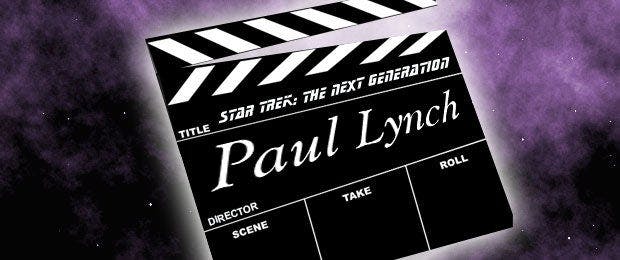
Paul Lynch will always be cool in our book. This is the guy who directed Prom Night, one of the better 80’s slasher flicks and the one that cemented Jamie Lee Curtis’ scream-queen status. The very same Paul Lynch was also an in-demand television director from the 1970s through the early 2000s, calling the shots on everything from Moonlighting, Beauty and the Beast and The Twilight Zone to RoboCop, Xena: Warrior Princess and So Weird. He played a pivotal role in the Star Trek universe as well, directing five early episodes each of The Next Generation and Deep Space Nine, and helping to establish characters and relationships on both shows. His episodes included TNG’s “The Naked Now,” “11001001,” “Unnatural Selection,” “A Matter of Time” and “The First Duty,” as well as DS9’s “A Man Alone,” “Babel,” “Q-Less,” “The Passenger” and “Battle Lines.” StarTrek.com recently caught up with Lynch – who was born in England, spent much of his career in Canada, and currently splits his time between Los Angeles and Hamilton, outside of Toronto, Canada -- for a wide-ranging interview in which he commented in detail on his Star Trek work and updated us on his current projects. Below is part one of our two-part conversation, and tune into StarTrek.com again tomorrow to read part two.
How did you land your first TNG directing assignment?
Lynch: I don’t know how they found me, but I went over for an interview with them, and I talked to Bob Justman and Rick Berman. Rick had been an executive at Paramount, and he seemed to be second to Bob, who was with Gene Roddenberry forever. Rick became the show runner when Bob left, and Bob was a terrific guy and we got along great. Bob hired me for what was the first episode after the TNG pilot.
What were you thoughts on the cast that had been assembled?
Lynch: They put together a really terrific cast. Everybody was top-notch and they were nice people. Corey Allen had done the pilot. He’d been an actor. He was in Rebel without a Cause. He’d also taught acting. So he’d set the tone for everyone. Patrick Stewart was an incredible pro actor. People think I say this because I was born in England, but it’s not true. English actors, because of the way they come into the business, through crummy little theaters, tend to be incredibly professional. Their body is their instrument, and they’re pros. I remember Richard Harris telling me that the worst thing that English actors ever did was get drunk in the night, otherwise they were pros, and even the drunks had found ways to know their lines, always. So there was a level of professionalism. Patrick had it, and he just had a force of personality. He was the nicest and humblest man, ever, for the talent he had. And with that force of personality, if an actor dropped a line, all he had to do was look at them and they’d never drop it again. So, by the time I got there, they already had a great-knit group that was taking their cue from Patrick. So it was effortless.
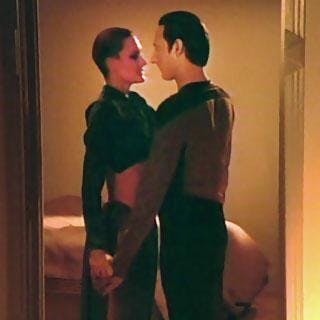
Lynch: First of all, that was a remake of another show that they’d done the show. D.C. Fontana wrote the original and she’d worked with Gene a long time, and she wrote this, too. What stands out for me was Brent Spiner’s performance with Denise Crosby. They were wonderful together. They were like Ricky and Lucy. That’s what immediately stood out, their fun scenes, and that’s what stood out, the humor, which is why I think I got the job, actually. I’d come over from doing Moonlighting.
OK, since we’ve got you, we must ask about a strange little detail. What was up with that greased, twisted bit of hair on Crosby's forehead?
Lynch: I don’t remember. Sorry, I don’t remember that.
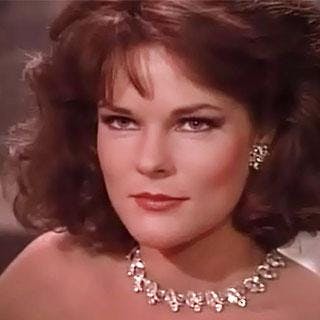
So the debate will continue. Let’s move on to “11001001”...
Lynch: That was the one with the Bynars in it, who talked together. That was another kind of light, light, light show, and it had the romance in it between Riker and the hologram girl. Carolyn McCormick played Minuet, and she, not long after that, went on to a major part on Spenser for Hire with Bob Urich. I worked with him years later. Carolyn was a nice woman, very talented, and she and Jonathan (Frakes) had a very hot thing going on in this (holodeck) fantasy lounge.
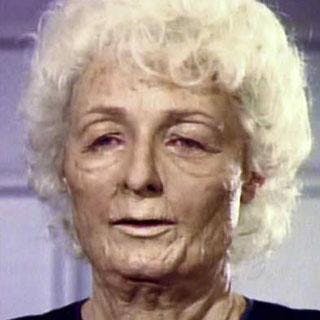
“Unnatural Selection”…
Lynch: That was a heavy Diana Muldaur episode and it was, I’m told the first episode in which Colm Meaney was listed as a guest star. Colm, like Patrick, was an absolute pro. Diana was just great in it, just terrific. She’d come into the show maybe because she was bored or something. I didn’t get the impression that she needed the job. By this time, Gates McFadden had left, and so Diana was terrific.
“A Matter of Time”…
Lynch: That had a very good script by Rick Berman, and Matt Frewer was perfect for the episode. He was the guy who was stealing things, but they think he’s somebody else. It was really a nice little mystery and a very entertaining episode. Matt was another Canadian, and he’s studied in London, which was where he started doing Max Headroom. That’s what brought him to America. He was another pro.
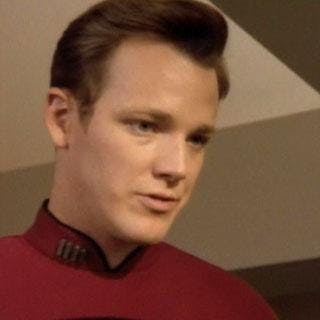
Your last TNG episode was “The First Duty”...
Lynch: I didn’t even realize this, but I had hired (guest star) Robert Duncan McNeill for a Twilight Zone that I did. He was really terrific. Compared to young actors today he was like Marlon Brando. It was a 40-minute Twilight Zone. So I brought him in to audition for “The First Duty” and they agreed that he was great, and they hired him. It was a really interesting episode and now, because of this relationship the producers now had with Robbie, they brought him back later to star in Voyager. As you know, he started directing on that, and now he’s a very respected television director. We also had Ray Walston in that episode. He was a wonderful guy with wonderful stories and a great, old pro. I was very busy on the set, but out of the side of my eye I’d see Patrick Stewart and Ray Walston hanging out, and that seemed right to me. An American pro and an English pro, equal, and they were terrific together.
Of the five TNG episodes you directed, which did you feel turned out best and which were you most disappointed in?
Lynch: That’s a toughie. I was very lucky that I got really good scripts. I think “A Matter of Time” would be my least favorite and my first one, “The Naked Now,” would be my favorite.
Really? Most Star Trek fans would consider “The Naked Now” to be the weakest and “Unnatural Selection,” “A Matter of Time” or “The First Duty” to be the best…
Lynch: I think there’s a reason for that, for the negative reaction to “The Naked Now,” and that is that it presented the cast from the pilot in a completely different way, so it was hard for people to accept that. But that is what I liked about it. You saw the pilot. You saw the actors being straight dramatic actors. That first episode, they went off on this wonky trip. Then, in the next episode they’re back to being what they were. I liked that -- and this was Gene and Bob – because it set up that you don’t know where the show was going to go. That’s what made the show so incredibly entertaining, that it wasn’t just a detective show or a comedy. It could be a detective show this week and a comedy the next week or a thriller or an action show. Then you had the science fiction and the special effects. That was one of the big plusses of the show, but I’d heard that people didn’t like “The Naked Now” as much because the characters changed way out of what they knew.
Check back tomorrow to read part two of our interview with Paul Lynch, in which he recounts his DS9 experiences, looks at his non-Trek career and talks about what he’s working on now.

